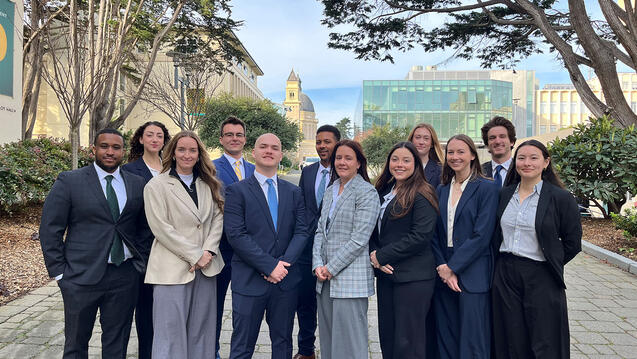Revolutionizing Legal Ed With Mindfulness: Prof. Rhonda Magee Retires

In 1998, Rhonda Magee left corporate law practice in Chicago to teach at USF School of Law.
In the course of her teaching career with USF, she has served as a Dean’s Circle Research Scholar, co-directed the university’s Center for Teaching Excellence, and collaborated on the Ignatian Faculty Forum faculty development program. Throughout the years, she has taught Torts, Race, Law and Policy, Insurance Law, and Immigration Law and Policy. In 2019 she published The Hidden Work of Racial Justice: Healing Ourselves and Transforming Our Communities Through Mindfulness and three years later, she founded the School of Law’s Center for Contemplative Law & Ethics. After more than 25 years at USF, Magee has retired.
“Mindfulness is a higher level of skill for lawyers”
Magee found her mindfulness practice as an adult and soon realized that her grandmother had demonstrated the same skills when she was young. “My grandmother was tending to her own need for a centering foundation through prayer and quiet that could hold her complex realities.” What was fundamental to her grandmother became fundamental to Magee personally and professionally. In her first years with USF, Magee taught from the standard course casebooks on race and the law. Starting in 2004, “I put the casebooks I had been using aside and created my own materials — cases, articles, etc. And I brought mindfulness into the classes.” She received positive feedback. “Mindfulness is a higher level of skill for lawyers. At minimum, mindfulness teaches us to learn beyond cognitive skills by developing better social and emotional intelligence. It teaches us to respond rather than react.” The skills also give law students sturdy support when they are prone to developing “cynicism creep” about the systemic injustices inherently studied in class. Teaching mindfulness as a skill became a foundational part of the curriculum.
The Inner and Outer Work
Over the years, Magee further evolved courses to incorporate ways of addressing both professional identity development and multicultural lawyering in unique and innovative ways by underscoring the inner work and ethical dimensions of each. Magee always reminded her students, “We as lawyers have the ever-present possibility that although we seek to be a vehicle for positive change, we can actually find ourselves colluding with patterns of oppression. It’s a risk that we are responsible for paying attention to.” Mindfulness teaches students to pay attention and develop their own ethical professional identity.
Paired with an inner work approach to teaching, Magee developed a fresh outward approach to her classes: contextual law. Contextual law puts the study of law into a social-political context. A context-concerned approach provides students with the stories of those most affected by a law. With a contextual lens, Magee says, “We seek to disrupt the old patterns of who wins and who loses in the application of law. Contextual law is really the key to law that has the look and feel of actual justice as opposed to power availing itself.… Justice just feels different.” Associate Dean for Academic Affairs Amy Flynn ‘04 adds, “Rhonda’s leadership and innovative teaching continually demonstrate the need for inner work as a step toward the outer work of advocacy and change.”
As she reflects on her legacy at USF, Magee expects “that the School of Law will continue to support cutting-edge teaching and learning about the legacies of our shared multicultural histories and how they impact law and policy today. If we can continue to center on ethics and the cultivation of an ethical-professional identity with this inner dimension to it, I’ll be proud, I’ll feel like there is a little bit of ‘me’ in that.”


